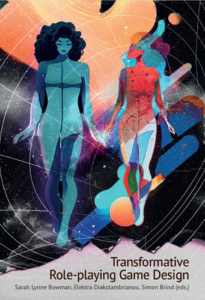Hello everyone,
We are delighted to announce that Transformative Role-playing Game Design textbook is now available for download and print on demand! The book is the first in a series of two developed by the EDGE Consortium, an Erasmus+ Cooperation Partnership, featuring authors from Uppsala University, Dragons’ Nest, Avalon Larp Studio, Chaos League, and Turku University of Applied Sciences. The peer-reviewed book has been published in the new Transformative Play Research Series within Acta Universitatis Upsaliensis at Uppsala University.

Table of contents:
Preface
Sarah Lynne Bowman, Elektra Diakolambrianou, Simon Brind
Chapter 1: A Brief Introduction to Role-playing Games and Cousin Forms
Sarah Lynne Bowman, Elektra Diakolambrianou, Angie Bandhoesingh, Alessandro Giovannucci, Guus Quinten van Tilborg, Taisto Suominen
Chapter 2: Transformative Role-playing Games: Types, Purposes, and Features
Sarah Lynne Bowman, Elektra Diakolambrianou, Kjell Hedgard Hugaas, Josephine Baird, Josefin Westborg
Chapter 3: Theory, Central Concepts, and Inspirational Materials
Sarah Lynne Bowman, Elektra Diakolambrianou, Simon Brind, Kjell Hedgard Hugaas, Josefin Westborg
Chapter 4: Practice: Transformative Role-playing Game Design and Research
Sarah Lynne Bowman, Simon Brind, Kjell Hedgard Hugaas, Alessandro Giovannucci, Josefin Westborg
Chapter 5: Safety and Community Container Setting
Sarah Lynne Bowman, Elektra Diakolambrianou, Angie Bandhoesingh, Kjell Hedgard Hugaas, Josephine Baird, Josefin Westborg
Chapter 6: Myth, Symbolism, Ritual, Magic, Narrative, Culture, and Conflict
Sarah Lynne Bowman, Elektra Diakolambrianou, Simon Brind, Kjell Hedgard Hugaas, Alessandro Giovannucci, Guus Quinten van Tilborg, Josephine Baird
Chapter 7: Research in Transformative Game Design
Sarah Lynne Bowman, Elektra Diakolambrianou, Kjell Hedgard Hugaas, Josephine Baird, Taisto Suominen
Synopsis:
This textbook describes theory and practice in analog role-playing game (RPG) design that encourage specific transformative impacts in participants, including tabletop, live action role-playing (larp), and Nordic and American freeform. We describe three types of transformative RPGs: transformative leisure, therapeutic, and educational. We present our model of nano-game design, offering recommendations for designing transformative goals; framing activities such as workshops and debriefs; narrative and culture design.
This interdisciplinary book highlights theories from role-playing game studies, peace and conflict studies, psychology, social psychology, sociology, counseling, anthropology, pedagogy, and several other fields. Key concepts include bleed, alibi, RPGs as transformational containers, immersion, identity, transfer, ritual, psychotherapeutic techniques, group theories, and educational theories. We emphasize psychological safety before, during, and after games, as well as strategies for cultivating transformational communities. Key topics include working with specific populations; crisis management; sensitive content and representation.
Then, we discuss working with myth, symbolism, and ritual, narrative, and postmodern magic as methods for transforming the stories of our lives. We cover forms of culture within and around RPGs, as well working with conflict in scenarios related to politics, culture, gender, sexuality, race, and ethnicity. We share thoughts around the use of RPGs to foster activism, advocacy, inclusion, and accessibility.
Finally, we offer considerations for researchers studying transformative role-playing games, including academic argument, structure, theory, method, data collection, ethics, and other considerations. We introduce key methods, including Research through Design, ethnography, and qualitative and quantitative data analysis. The book closes with a summary of evidence-based research available on the cognitive, affective, and behavioral effects of role-playing games.
* * *
We hope you enjoy!

